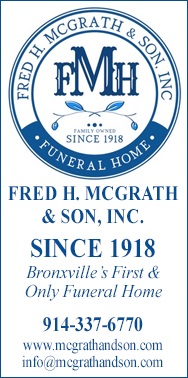Letter to the Community Regarding Proposed Crosswalk Across NY-22

Jan. 18, 2023
To the Community,
In recent years, the Bronxville Board of Trustees has admirably focused on promoting walking and improving safe walkability within the village. Unfortunately, the Board has recently taken a step in the wrong direction by proposing the creation of an unsafe crosswalk across NY-22 (White Plains Road) at Elm Rock Road and an associated circuitous pedestrian corridor to the school. As envisioned, this corridor would zigzag from NY-22 down Elm Rock, to Oriole Avenue, to Orchard Place, and then either to Beechwood Road and Masterton Road or to Studio Lane and Hemlock Road down to the school at Midland Avenue.
Many residents who would be directly affected by the proposal — because they live on properties adjacent to the proposed crosswalk or the corridor — remain unaware of it. And among those affected residents who have learned of it, opposition is nearly unanimous.
With good reason. The proposal suffers from doing the opposite of what it purportedly intends: it creates less safe streets and ignores safer alternatives that have the added benefit of being less costly and less burdensome on village residents.
Specifically, the proposed project would funnel school children and other pedestrians to a point on NY-22 where no crosswalk currently exists or has ever existed and where no stoplight currently exists or would be installed. Motion-triggered blinking lights next to the crosswalk are unlikely to effectively and safely control bus, truck, emergency vehicle, and car traffic on NY-22, a state highway not subject to the new ordinance lowering village speed limits to 25 mph.
The proposal ignores the plainly safer and more logical locations for the placement of crosswalks on NY-22: at Pondfield Road and at Tanglewylde Avenue / North Road. Both of these locations already have existing stoplights and bus stops, yet both lack crosswalks. These superior locations leverage key existing safety infrastructure — stoplights — and would better serve a wider cross-section of the village community, including village residents south of Pondfield, who would not benefit from the current proposal.
Crosswalks at Pondfield and Tanglewylde also would cause less disruption to the village and impose few costs. By contrast, the proposed pedestrian corridor would (i) limitstreet parking and require the installation of reflectors, signage, and painted street walking lanes along much of its route; (ii) impose maintenance and liability obligations for sidewalks or walking lanes on adjacent homeowners; (iii) encourage the use of a less direct and less safe path to the school and the village downtown; and (iv) increase the congestion and density of the streets along the corridor and damage their residential charm.
In light of more pressing needs of greater benefit and lower cost to more village residents, such as to repair and improve existing sidewalks along Pondfield, along Masterton, on NY-22 between Pondfield and Sussex, and elsewhere, it is puzzling that the Board would choose to promote this proposal. Also concerning is the lack of information provided to affected village residents over the past year and the hidden shifting of costs onto a large segment of village residents for the benefit of a small constituency of unaffected residents promoting a project that does not leverage existing infrastructure.
Fortunately, the Board has thoughtfully listened to resident concerns and recently indicated a willingness to advance the better crosswalk proposals. Although nothing has come of it to date, the Board submitted an application for the state to install a crosswalk at Pondfield in 2017, and the Board recently has indicated a willingness to push it forward. In a meeting last Wednesday, the Board also raised consideration of a crosswalk at Tanglewylde, and in an e-mailed letter on Thursday the Mayor indicated that the state has said it intends to install a crosswalk at Tanglewylde this year. The village would be better served by working together to advance both of these projects to completion than by continuing with the misguided Elm Rock crosswalk proposal.
We commend the Mayor and the Board for properly hitting the pause button on the Elm Rock proposal in November in response to the immediate opposition and concerns that knowledge of the proposal generated among a subset of affected village residents. Since that time, opposition among affected residents has only grown. The Board should now do the right thing by stopping the project completely. Instead of proceeding, it should take a deep breath, step back and conduct a comprehensive assessment across the entire village, and not consider projects on a piece-meal basis depending on who has the ear of the Board. This inclusive approach would determine the highest-value projects for improving safe walkability for the greatest number of village residents while minimizing cost-shifting and other negative consequences.
Sincerely,
Claudia Amboss
Rodolpho Amboss
Scott Bacigalupo
Tara Bacigalupo
Anthony Beldotti
Doreen Beldotti
Peter Bonventre
Bill Dougherty
Tara Dougherty
Lisa Guillory
Jim Hennessy
Maureen Hennessy
Alicia Jensen
Arjay Jensen
Joanne E. Johnson
Jonathan Kelton
Lauren Kelton
Jeanne McFadden
Drew Melchionni
Katie Melchionni
Carter Neild
Tania Neild
Donna Olshan
Edward A. Reilly, Jr.
Tom Sipple
Brian Smith
Justin Smith
Kristin Smith
Jennifer Spitz
Roger Spitz
Audree Tadros
Rami Tadros
Emily Weber
Nate Weber
Alexa Zannetos
Steve Zannetos
Letters Directory
Bronxville is a quaint village (one square mile) located just 16 miles north of midtown Manhattan (roughly 30 minutes on the train) and has a population of approximately 6,500. It is known as a premier community with an excellent public school (K-12) and easy access to Manhattan. Bronxville offers many amenities including an attractive business district, a hospital (Lawrence Hospital), public paddle and tennis courts, fine dining at local restaurants, two private country clubs and a community library.
While the earliest settlers of Bronxville date back to the first half of the 18th century, the history of the modern suburb of Bronxville began in 1890 when William Van Duzer Lawrence purchased a farm and commissioned the architect, William A. Bates, to design a planned community of houses for well-known artists and professionals that became a thriving art colony. This community, now called Lawrence Park, is listed on the National register of Historic Places and many of the homes still have artists’ studios. A neighborhood association within Lawrence Park called “The Hilltop Association” keeps this heritage alive with art shows and other events for neighbors.
Bronxville offers many charming neighborhoods as well as a variety of living options for residents including single family homes, town houses, cooperatives and condominiums. One of the chief benefits of living in “the village” is that your children can attend the Bronxville School.
The Bronxville postal zone (10708, known as “Bronxville PO”) includes the village of Bronxville as well as the Chester Heights section of Eastchester, parts of Tuckahoe and the Lawrence Park West, Cedar Knolls, Armour Villa and Longvale sections of Yonkers. Many of these areas have their own distinct character. For instance, the Armour Villa section has many historic homes and even has its own newsletter called “The Villa Voice” which reports on neighborhood news.
Village of Bronxville Administrative Offices
337-6500
Open 9:00am - 4pm excluding holidays and weekends
Bronxville Police Department
337-0500
Open 24 hours
Bronxville Parking Violations
337-2024
Open 9:00am - 4pm excluding holidays and weekends
Bronxville Fire Deparment
793-6400







